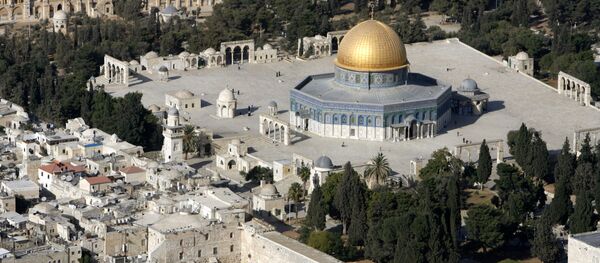President Donald Trump’s reported decision to recognize Jerusalem as the capital of Israel has set off a veritable tidal wave of angry condemnations in the Arab and Muslim countries.
In the latest sign of displeasure, Jordan has launched a diplomatic campaign to mobilize Arab and Muslim states to force Trump to reconsider his decision to move the US embassy from Tel Aviv to the Holy City.
Jordanian Foreign Minister Ayman Safadi, in his turn, warned the United States of "dangerous consequences" if the latter recognizing Jerusalem as the capital of Israel.
Spoke with #US Secretary of State Tillerson on dangerous consequences of recognizing Jerusalem as capital of Israel. Such a decision would trigger anger across #Arab #Muslim worlds, fuel tension & jeopardize peace efforts.
— Ayman Safadi (@AymanHsafadi) 3 декабря 2017 г.
The diplomatic source, who was speaking on condition of anonymity, warned that Trump's decision "could ultimately hamper all efforts to get the peace process moving and holds a very high risk of provoking Arab and Muslim countries and Muslim communities in the West."
Arab League Secretary-General Ahmed Aboul Gheit has likewise condemned Trump’s idea describing it as “not justified” and contrary to peace and stability.
“It only benefits one side; the Israeli government which is hostile to peace,” he said.
Mahmoud Habash, one of the top advisors to Palestinian President Mahmoud Abbas, warned that “the world will pay the price” for any change in the status of Jerusalem, and that its recognition as the capital of the Jewish State was fraught with “complete destruction of the peace process.”
The Palestinian resistance movement Hamas also urged Washington to give up on its planned relocation of the US embassy to Jerusalem.
The international community does not recognize Israel's claim on the entire city, largely considering East Jerusalem, including the Old City, to be part of Palestine.
Jerusalem is sacred for the followers of three major religions, Judaism, Christianity and Islam.
At the heart of the dispute is the legal status of East Jerusalem. Israel proclaimed its ownership over East Jerusalem after the Six-Day War Israel fought with Egypt and Syria in in 1967, a move that has not been recognized by the majority of UN states and international organizations. As the political status of Jerusalem has not been recognized internationally, there are no foreign embassies located in Jerusalem.
READ MORE: Trump Wants to 'Give Peace a Shot' Before Moving US Embassy to Jerusalem
Palestinians want to create an independent state on the territories of the West Bank, including East Jerusalem, partially occupied by Israel, and the Gaza Strip, and want Israel to withdraw from the Palestinian territories it seized during the Six-Day War.
In 1980, the Israeli Parliament passed the Jerusalem Law declaring Jerusalem the unified capital of Israel. The action has not been recognized by any other country, including the United States.




